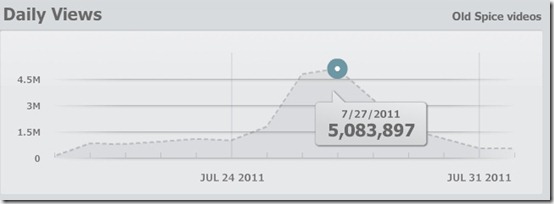Home » web2.0 (Page 2)
Category Archives: web2.0
Old Spice Guy … versus Fabio?!?

It has been just over a year since Isaiah Mustafa’s Old Spice Man character moved from traditional advertising spaces and conquered the internet with the fantastic rolling campaign of YouTube ‘reply’ videos. I am a huge fan of that 2010 campaign and think it’s still one of the best examples of a dusty brand embracing participatory culture completely and reaping the rewards. This week, the next iteration in that social media campaign has kicked off, with cultural manhood cliché Fabio attempting to wrestle away Mustafa’s Old Spice man crown. Mustafa accepted the challenge and now a ‘battle’ rages ‘Live at Internet Stadium’ with the two both replying to challenges and comments from participants online.
Commentators have already jumped on this as an example of advertising embracing transmedia storytelling in what seems a quite meaningful way. For example, Hypervocal comments:
We don’t know how this will all play out today, but the Old Spice Guy campaign has now transcended mere advertising into the realm of long form digital storytelling. It’s fairly incredible what Old Spice and W+K have established. We’re seeing a full-on social media duel unfold across Twitter and YouTube that doubles as a quasi-advertising campaign (except that nobody cares about the Old Spice connection, they care about the characters and story) — people are being called out directly on both platforms, dates and times for the duel were announced, and tweets and videos will surely be published in a real-time, but coordinated, environment later today.
I agree that this has transcended traditional advertising, but in doing so it asks to be judged in terms of storytelling, not just advertising. Now perhaps I’m not the right person to ‘get’ this duel; I’ve never found Fabio a convincing character and just don’t find him funny. (Nor it seems does the internet; his challenge has more ‘dislikes’ than likes, but Mustafa’s reply is almost entirely ‘liked’.) However, for me, as a narrative experience, the Old Spice campaign has jumped the shark. The ‘duel’ doesn’t appear to be over yet, and perhaps I’ll be won over, but for now both the manly men vying for the Old Spice crown seem burdened by their roles, not excited by it. Fabio is a weary icon at best, and Mustafa’s lines just aren’t as funny as last year.

Update: Surprising no one, the Old Spice guy (Mustafa) won the ‘duel’, but the pathway there, through numerous odd videos, was a bizarre one, even by internet standards. Just watch the final showdown video to see odd things really got:

Update 2: YouTube have run the numbers, and the Old Spice Guy versus Fabio videos (over 100 of them) clocked up 22 million views in a week, with the viewing peaking with just over 5 million views in a single day.
Google+
Yes Google+ is the Googleplex’s latest foray into social networking, trying to explicitly tackle the same territory Facebook’s Social Graph, but sadly I don’t have time right now to write about it (I’ll wait until I actually have access, rather than the screenshots floating around). In the meantime, XKCD have a great summary:
You could also read Google’s official announcement and commentary in the New York Times, the Guardian or from Steven Levy in Wired (and quite a few other places, too).
Everything is a Remix–Part 3 – Creativity
Kirby Ferguson has followed up the episode on film with another fabulous offering in the Everything is a Remix series. This one looks at creativity and debunks the myth that creativity is the product of a few (arguing, instead, it’s always the product of many):
Three Big Pigs: Angry Birds/Disney Middle East Mashup
As Ethan Zuckerman says: “There’s something very 2011 about a Russian video using a soundtrack from American cartoons and characters from a Finnish mobile phone game (based on an English fairytale) to satirize North African politics.”
Understanding Creative Commons for Education
Late last year I was interviewed about online teaching by the team UNSW’s COFA team for their Learning to Teach Online project which aims to build a rich library of resources for teachers working online in various forms. You can find my talking head peppered throughout a number of their video episodes, but the main one, and one I’m really pleased to see up, is all about Understanding Creative Commons for education. I’ve embedded the video below, but you can also get a printable resources hand-out over and the Learning to Teaching Online page.
Incidentally, it’s worth mentioning that this video is about both how teachers and use Creative Commons licenses, but also, and quite importantly, about how students can use CC licenses when producing their own worth, be that text, photos, video or other combinations of media. If you’re an educator interested in this area, you might also enjoy the short paper I wrote a few years ago called ‘The Creative Commons: An Overview for Educators’.
Digital Culture Links: September 23rd 2010
Links for September 22nd 2010 through September 23rd 2010:
- Zotero Everywhere [Zotero Blog] – The big announcement from Zotero is that the reference management system is growing up from a Firefox-specific plugin to plugins for many browsers and even more importantly, a stand-alone desktop application. That’s the death of Endnote you can hear! The announcement: “Today we are announcing support for Google Chrome, Apple Safari, and Microsoft Internet Explorer, which account for 98% of the web’s usage share. Plugins for these browsers will soon allow users to add anything they find on the web to their Zotero libraries with a single click, regardless of the their browser preferences. Rather than use the Zotero pane in Firefox, users will have the new option of accessing their libraries via a standalone desktop version of Zotero, available for Mac, Windows, and Linux.”
- Google’s Chief Defends His Privacy Comment — or Joke [NYTimes.com] – In an interesting on his infamous comment that teens should be able to change their names when they become legal adults in order to escape their online histories, Google CEO Eric Schmidt told The Colbert Report that then comment was intended as a joke and his intention was simply to emphasise the fact that once something is online it’s potentially there forever. This is either a very clever sidestep by Schmidt to get around one of this most legendary gaffs, or the slowest retraction ever not-quite-issued. See the video:
The Colbert Report Mon – Thurs 11:30pm / 10:30c Eric Schmidt Colbert Report Full Episodes 2010 Election Fox News - Announcement: Dissertation, “Status Update: Celebrity, Publicity, and Self-Branding in Web 2.0,” now available [tiara.org] – Alice Marwick has generously shared her 2010 Ph D dissertation, “Status Update: Celebrity, Publicity, and Self-Branding in Web 2.0.” under a Creative Commons (CC BY NC ND) license (PDF link). This is a must-read for those interested in social media, the way Web 2.0 is used (Marwick does a great job contextualising the term) and obviously social media more broadly. (Strongly recommended for Web 101 and Web 207 students.)
- A Better Games Experience [Facebook] – Facebook moves to reduce the number of people annoyed by social game feeds in their news, while making the game news more central for social/casual gamers: “Previously, you’ve had the ability to hide an application story, or block it completely. Now, we’re putting changes in place so game stories only post to your feed if you’re playing them. This means people who play games can post stories to their Wall without worrying about overwhelming their friends who aren’t playing, and people who don’t play games won’t see irrelevant stories in their feed for which they have no context.”
- Twitter patches hole after cyber attack [ABC News (Australian Broadcasting Corporation)] – “Twitter has fixed a security flaw on its popular social media website after a cyber attack sent some users to Japanese porn websites. […] It said no user information was compromised. A tweet from Twitter’s safety chief said the attack had been “fully patched” and that hackers could no longer exploit the flaw. “We don’t believe any user info was compromised,” the tweet said. Twitter’s website was hijacked by users who exploited a security flaw that allowed messages to pop up and third-party websites to open when a user moved their mouse over a link, security technology company Sophos said. Sophos, which has no formal business relationship with Twitter, says the messages spread without users’ consent.” Twitter’s Official Response
On the Rise of Apps …
A neat visualisation from Flowtown on the back of a recent Pew report on US-based mobile and App use.
Ping: It Just Doesn’t Work

Amongst the hoppla about Apple’s revamped-once-more iPod updates this week, something slightly different emerged: Steve Jobs announced the release of Apple’s new music-based social network Ping. Given Apple’s reputation for designing hardware and software with the philosophy “It Just Works”, you’d imagine Ping would be worth exploring. At this stage, at least, though, you’d be wrong: as a social network, Ping is dead on arrival. Perhaps that’s because Jobs originally wanted to connect Ping with Facebook so users could populate their friend connections easily. Apparently that hasn’t happened because Apple and Facebook have their own terms and conditions for playing in their walled gardens, and the two aren’t compatible (the New York Times is now calling the two companies ‘frenemies’).
In Dave Winer’s wrap-up of Ping, he highlights the major problems: no one’s using it yet, it’s really hard to actually find other users, it only runs in iTunes (not traditional browsers), and it’s based on your purchase history – not your listening history – with no option to add non-purchased music to your own interests. In short, Ping’s all about your iTunes store purchases; clearly Apple’s motivation is to build more interaction and recommendations between users, but unless you’re a big iTunes store purchasers, I can’t see how this service will ever ‘know’ enough about you to be useful (and, no, I wouldn’t take the trouble to list my interests even if I could now, since the only way for people to find me is to string search for names or emails). Beyond that, spammers are already moving in.
Apple have implemented pretty simple privacy controls, but given your Ping identity has to be the name associated with your iTunes Store account, it’s unclear whether anyone can use nicknames (I can’t find a way) which leads to its own privacy issues. Sure, this is the first iteration of Ping, and it’s likely to be improved, but there’s a long way to go and releasing this minimal a social network really doesn’t do Apple any favours. While Mashable suggested Ping would be the last nail in MySpace’s coffin, the amount Apple got wrong with Ping actually reminds us that MySpace really wasn’t (and for many people, isn’t) that bad! Ping: it just doesn’t work.
Wikipedia: What’s in it for Teachers?
[This article was originally published in Screen Education, 53, Autumn 2009, pp. 38-42. It is reproduced here with permission.]
Love it or hate it, everyone has heard of the Wikipedia. Explore most topical subjects on popular search engines like Google and the relevant Wikipedia entry will almost always be in the first few items returned. And far from a flash in the pan, on January 15 2010, the Wikipedia celebrated its ninth birthday, now encompassing more than 10 million articles spanning over 250 different languages. Yet, for teachers and academics the Wikipedia can be a constant source of concern as students increasingly start (and, in the worst cases, end) research on a new topic with a quick peruse of the Wikipedia entry. The biggest concern comes from the core premise of the Wikipedia: it’s an online encyclopaedia that can, literally, be edited by anyone. Yet for all of the fashionable talk of crowdsourcing, collective intelligence and the wisdom of the crowds, most educators prefer their students to be using sources which have more authority and reputation behind them. But is that concern warranted, and given that the Wikipedia is slowly finding a home in classrooms across Australia, what do teachers really need to know about the Wikipedia?
How the Wikipedia Works
From the outset, it is useful to remember that the Wikipedia is just one example, albeit the most well-known, of a website which uses wiki software. A wiki, by definition, is type of software which powers websites and allows anyone to edit and contribute. The wiki software that provides the architecture for the Wikipedia is called MediaWiki and is freely downloadable and reusable (see MediaWiki.org) although that requires server-space and a reasonable level of technical skill. If you’re interested in trying out a wiki, or using a free wiki in teaching, pbworks.com is a good place to start, providing basic wiki functionality for free (and more comprehensive tools for teaching for a fee).
The Wikipedia itself was launched in January 2001 by Jimmy Wales and Larry Sanger, taking its name from the combination of the words wiki and encyclopaedia. The aim of the Wikipedia is fairly simple: to produce and continually improve an online encyclopaedia that is free for anyone to use and, most importantly, can be edited by anyone. After a slow start, the Wikipedia today features over 3.3 million articles in English, with articles in hundreds of languages and it is one of the most popular reference works in the world.
Since the range of articles in the Wikipedia is largely dependant on the interest of contributors (referred to as Wikipedians), the coverage is often uneven; popular culture, recent historical events, and technical issues tend to be very well represented while less topical or more geographically-specific material can be sparse. For example, the Wikipedia entry for the current run of the popular BBC series Top Gear is more than five times longer and has more than three times the references compared to the article for Australian novelist Tim Winton. More to the point, since Wikipedia entries tend to grow over time though the contributions of many editors, newer entries are often less reliable, while those which have been edited and critiqued by a range of Wikipedians tend to be more reliable. The question of reliability, though, given the huge range of people who might contribute to, or ostensibly damage, an article, remains the most divisive issue for lovers and haters of the Wikipedia.
The Reliability Question
While the idea that anyone can edit the Wikipedia causes many people to scoff at the idea of it having any credibility whatsoever, this presumption has actually been tested far less often than it should be. In 2004, Alex Halavais, an assistant professor at Quinnipiac University, looked in to the question of the Wikipedia’s credibility and was surprised to find almost no research on the issue whatsoever. After an online discussion, he decided to test out the speed at which the numerous editors of the Wikipedia would actually be able to fix mistakes. Halavais created a pseudonym and a Wikipedia profile as ‘Dr al-Halawi’ and made 13 deliberate errors, some obvious and some obscure. He predicted that within two weeks many of these errors would remain undetected. However, within several hours, all of the deliberate errors were identified by other Wikipedians and those errors were removed.
Writing in his blog (alex.halavais.net), Halavais noted that he was genuinely impressed by the speed and effectiveness with which the Wikipedia entries were corrected. While he conceded that his experiment didn’t ‘prove’ that the Wikipedia was reliable for everything, he did highlight the time and effort many people put into the Wikipedia, and that editors often also see themselves as guardians of particular articles, even obscure ones.
It’s worth explaining that one of the functions all registered Wikipedia users have access to is something called a Watchlist. Whenever an article on a user’s watchlist is edited by someone else, the watchlist user is sent a message and, upon notification, many Wikipedians will immediately examine the new material. In the cases of obvious vandalism or error, these errors are often ‘rolled back’ within minutes (that is, the Wikipedia entry is returned to the previous version before the errors were made). For more popular articles, Wikipedians with watchlists can be extremely effective, but even the more obscure articles often end up with one or two watchers, ensuring that obvious errors tend not to last that long. There are, of course, exceptions to that rule, especially for entries which not of ongoing interest to the Wikipedians who originally created them.
In December 2005, a more substantial and widely reported study was undertaken by the leading scientific journal Nature. Articles from the Wikipedia and the Encyclopaedia Britannica on the same topics were collected and then sent for blind-review to experts on those topics; the experts were not told which articles were from which source. While there were a few substantial errors in either, on average Wikipedia entries tended to have roughly 4 inaccuracies, while the same entries from the Encyclopaedia Britannica had approximately 3 errors. The results suggested that neither Wikipedia nor Britannica was flawless, but that the reliability gap between the two was fairly small. Indeed, given the seemingly haphazard manner in which Wikipedia entries and created and refined, the Nature study has been hailed by many commentators as evidence of impressive collective intelligence of Wikipedians, and of Wikipedia’s success and credibility.
The Nature examination also highlighted the biggest difference between the two sources: while errors in Britannica would have to wait until the next hardcopy edition was created, Wikipedia entries could be fixed instantly. Indeed, it is the speed at which the Wikipedia entries can appear and develop which is often mentioned as its greatest strength. And while neither the experiments of Halavais or Nature suggest Wikipedia is perfect, it appears almost as reliable as its well-respected hardcopy competitors.
The Neutrality Question
One of the core principles of the Wikipedia is that articles should be factual and be written using a Neutral Point of View (or NPOV). This policy ensures, for example, that any claims made without the appropriate sources or references can be easily identified and removed. However, given the breadth of material covered and the number of editors, the ideal of objectivity or neutrality is a difficult one to maintain. The entry on global warming, for example, has a long history of changes and arguments between editors which has, at times, led to certain Wikipedians being blocked from editing the entry. Similarly, while the Wikipedia could easily be used as a promotional tool or for self-aggrandisement, autobiography and obvious conflicts of interest are highly discouraged. The only exception to these guidelines is the right to correct obvious factual errors.
In 2007 the Howard government was wrapped up in its own scandal when a new website launched (unaffiliated with the Wikipedia) called the WikiScanner. The Wikiscanner highlights how many changes to the Wikipedia come from any particular internet address. Journalists and others quickly pounced on this tool and found that staff in Prime Minster Howard’s department had been actively editing unfavourable entries, including those about the 2001 Children Overboard Affair and the biography of Peter Costello. The Wikiscanner also revealed thousands of changes originating from computers in Australia’s Defence Department, although this practice was quickly clamped down on, with official Defence Department rules now preventing changes being made (while at work, at least). While many of the changes were either predictable (like inserting the word allegedly into reports about the Children Overboard Affair) or inconsequential, the fact that the Howard government or the Defence Department would bother to edit the Wikipedia is a clear indication of the wide impact the Wikipedia has had across Australia and the wider world.
In 2005 one of the most biggest controversies to hit the Wikipedia erupted when well-respected US journalist and political figure John Seigenthaler had it brought to his attention that the Wikipedia entry about him falsely accused Seigenthaler of being linked to the assassinations of John F Kennedy and Robert Kennedy. At issue was not just the false information, which was removed fairly quickly after the hoax entry was exposed, but the fact that the erroneous entry had last for 4 months before someone noticed the problem. Seigenthaler’s reputation and the obviously false accusations were something of a blow to the Wikipedia, and the issue of Wikipedia’s reliability again became a hot topic in the media. In response to the Seigenthaler incident, the Wikipedia introduced new safeguards which meant some entries were protected from editing, while others could only be edited by trusted Wikipedians who had proven their reliability with a history of useful contributions. This is illustrated, for example, in that immediately before and during the inauguration of Barack Obama, the entries both for Obama and George W Bush were in ‘semi-protected’ mode. This mode means only Wikipedians who’ve made non-controversial edits to more than 10 articles over a period of time and have thus earned a level of trust, can edit these biographies. The biographical entries for many current and recent political figures are in semi-protected mode, as this prevents anonymous users, first-time users and automated scripts from altering and vandalising content. While these restrictions alter the ‘anyone can edit’ philosophy behind the Wikipedia, the changes do offer a higher level of credibility and reliability, especially surrounding hot topics and public figures, trying to maintain the ideal of neutrality.
Using Wikipedia in the Classroom
So with the caveats about credibility and neutrality in mind, what place can the Wikipedia have in the classroom? More to the point, given that many of our students are using it whether endorsed by their teachers or not, how can we try and ensure that, at the very least, students approach the Wikipedia with a critical eye?
In trying to understand the Wikipedia, the most obvious approach is to try and design a project in which students edit or create a Wikipedia page. Such a project ensures that students get first-hand experience of everything from logging in, to creating content and then working with whatever alterations or contributions come from the broader Wikipedian community. The success or failure of such a project will often hinge on carefully considering the topic to create or explore. For example, editing the biography of John Howard might be interesting, but students are likely to come up against a fairly detailed existing entry and there will probably be quite a few vested Wikipedians watching over this entry; this, in turn, might see contributions from the classroom quickly overturned. However, one of the least well-documented areas of in the Wikipedia is often local history. So a project, for example, which involved students researching their local suburb’s history, or the history of a significant community landmark or event, is far more likely to be of value both as a project and to the Wikipedia itself. Wikipedia’s policy of ensuring material is referenced would require students to do decent research, while creating a local historical entry could add both to their understanding of local history and their understanding of the Wikipedia. Wikipedians themselves suggest that one of the best ways for teachers to introduce the Wikipedia is for the whole class to use a single username and password. This allows teachers to moderate and, if needs be, to remove student contributions. If you’re considering trying out using the Wikipedia as a classroom activity, it’s worth taking a look at the Wikipedia’s guide for teachers, at: http://simple.wikipedia.org/wiki/Wikipedia:Schools/Teachers%27_Guide.
Another possibility, rather than creating entries, is to study the Wikipedia as both a cultural and social entity. Making such a study of real value are some of the greatest assets of the Wikipedia, which are not the entries themselves, but the editorial histories which are linked to each and every Wikipedia entry. Every article has an associated Discussion and History page (accessed via tabs at the top of each entry). The Discussion page (often just called Talk) is the place where Wikipedians can propose, discuss, argue and critique changes and suggested changes to articles. These pages can sometimes be banal, but often they reveal a great deal about the way people think about particular topics; these discussions can also serve as a compass in measuring what the debates are surrounding certain topics or subjects. Similarly, the History page shows the detail of each and every change made to an entry since it was first created, including any instances where the entry was ‘rolled back’ to a previous version after a contribution that was not judged worthy by other users. Again, this depth of editorial knowledge can reveal a great deal about how certain topics are explored and the way entries have evolved. Beyond individual entries and their histories, studying the Wikipedia as an entity is made far more interesting by examining the Wikimedia Foundation, who run the Wikipedia; in a community of peers, they the ones who still hold unrivalled power in over the online encyclopaedia. Jimmy Wales, the remaining founder of the Wikipedia, is also a colourful and at times controversial character in his own right. It is worth noting that as part of the Global Village elective in this year’s English syllabus for the NSW HSC the Wikipedia itself is suggested as an object of study and amongst the suggested pages are those which discuss the Wikimedia Foundation, not just individual entries.
The final suggested classroom activity is for students to undertake a detailed analysis of an individual Wikipedia entry, often one which is on a currently controversial or topical issue. If, as the Nature investigation revealed, most Wikipedia entries have some errors, what might those errors be? If students were starting from scratch on a particular topic, how would they approach their research? Is this approach reflected in the Wikipedia entry, or do their plans already reveal deficiencies in the information available? What impact does the Wikipedia’s neutrality policy have on what information is and isn’t part of that particular entry? And how accurately, or meaningfully, does the Wikipedia entry reflect the history or impact of that subject today? In comparing the Wikipedia entries with other sources, not only are students likely to discover the strengths and weaknesses of the Wikipedia, but they’re also likely to develop broader insight into the way information is presented in different sources, both online and in more traditional forms. This critical literacy may, in fact, be of far more value than any single investigation of the Wikipedia whatsoever as it may help teach students one of the most important lessons: that all sources should be approached critically, regardless of their supposed origins. Errors are always possible, and if an investigation into the Wikipedia can highlight the subjective nature of all information, that insight will serve students far beyond the immediate project they’re undertaking.
The appropriateness of the Wikipedia as a classroom tool or project will always depend on the specificities of that teaching environment, but given the widespread impact of the Wikipedia, it seems better to study it and highlight its strengths and weaknesses rather than ignore it altogether. Another way to get a firmer grip on the Wikipedia is to seek out a the recently published How Wikipedia Works: And How You Can Be a Part of It by Phoebe Ayers, Charles Matthews, and Ben Yates (No Starch Press, 2008) which was written by three long-time Wikipedians and gives a wealth of insight into the inner workings of the Wikipedia, as well as best practice for new users and educators seeking to use the Wikipedia for the first time. However, the single most important thing to remind students is that despite being online, the Wikipedia aspires to being an excellent encyclopaedia; simply citing an encyclopaedia without further research has never led to good marks and that’s unlikely to change any time soon, be it an online encyclopaedia or otherwise. Every Wikipedia entry cites its sources, following these is where real research can often begin.
Digital Culture Links: August 24th 2010
Links for August 17th 2010 through August 24th 2010:
- Social Steganography: Learning to Hide in Plain Sight [DMLcentral] – danah boyd on social steganography: “… hiding information in plain sight, creating a message that can be read in one way by those who aren’t in the know and read differently by those who are. […] communicating to different audiences simultaneously, relying on specific cultural awareness to provide the right interpretive lens. […] Social steganography is one privacy tactic teens take when engaging in semi-public forums like Facebook. While adults have worked diligently to exclude people through privacy settings, many teenagers have been unable to exclude certain classes of adults – namely their parents – for quite some time. For this reason, they’ve had to develop new techniques to speak to their friends fully aware that their parents are overhearing. Social steganography is one of the most common techniques that teens employ. They do this because they care about privacy, they care about misinterpretation, they care about segmented communications strategies.”
- The Mother Lode: Welcome to the iMac Touch [Patently Apple] – A look at a patent for the future iMacs which shows the entire desktop computer will soon be enable as a giant touch-screen device thanks to the technology developed creating the iPad and Apple’s new iOS touch-based operating system.
- Sweden Rescinds Warrant for WikiLeaks Founder [NYTimes.com] – Julian Assange, the Wikileaks founder, was, for a brief time, up on rape and molestation chages in Sweden before the charges were rescinded just as quickly as they’d appealed. In a context where the Pentagon and others have said they’ve the resources to close Wikileaks and prosecute Assange, this whole debacle seems entirely suspicious.
- Share Bookmarklet [Twitter] – The official Twitter Bookmarklet, streamlining the sharing of any site or page on Twitter via a bookmarked link in your browser.
- Our Natalie raking in $100,000 a year from YouTube [The Age] – Australian YouTube sensation Natalie Tran is reported making more than $100,000 Australian dollars from the advertising on her clips, Community Channel.
- Facebook scam lures users craving ‘Dislike’ button [SMH] – This scam works because so many people want a DISLIKE button on Facebook! “Computer security firm Sophos has warned that scammers are duping Facebook users with a bogus “Dislike” button that slips malicious software onto machines. There is no “Dislike” version of the “Like” icon that members of the world’s top social networking website use to endorse online comments, stories, pictures or other content shared with friends. Hackers are enticing Facebook users to install an application pitched as a “Dislike” button that jokingly notifies contacts at the social networking service “now I can dislike all of your dumb posts.” Once granted permission to access a Facebook user’s profile, the application pumps out spam from the account and spreads itself by inviting the person’s friends to get the button, according to Sophos.”





